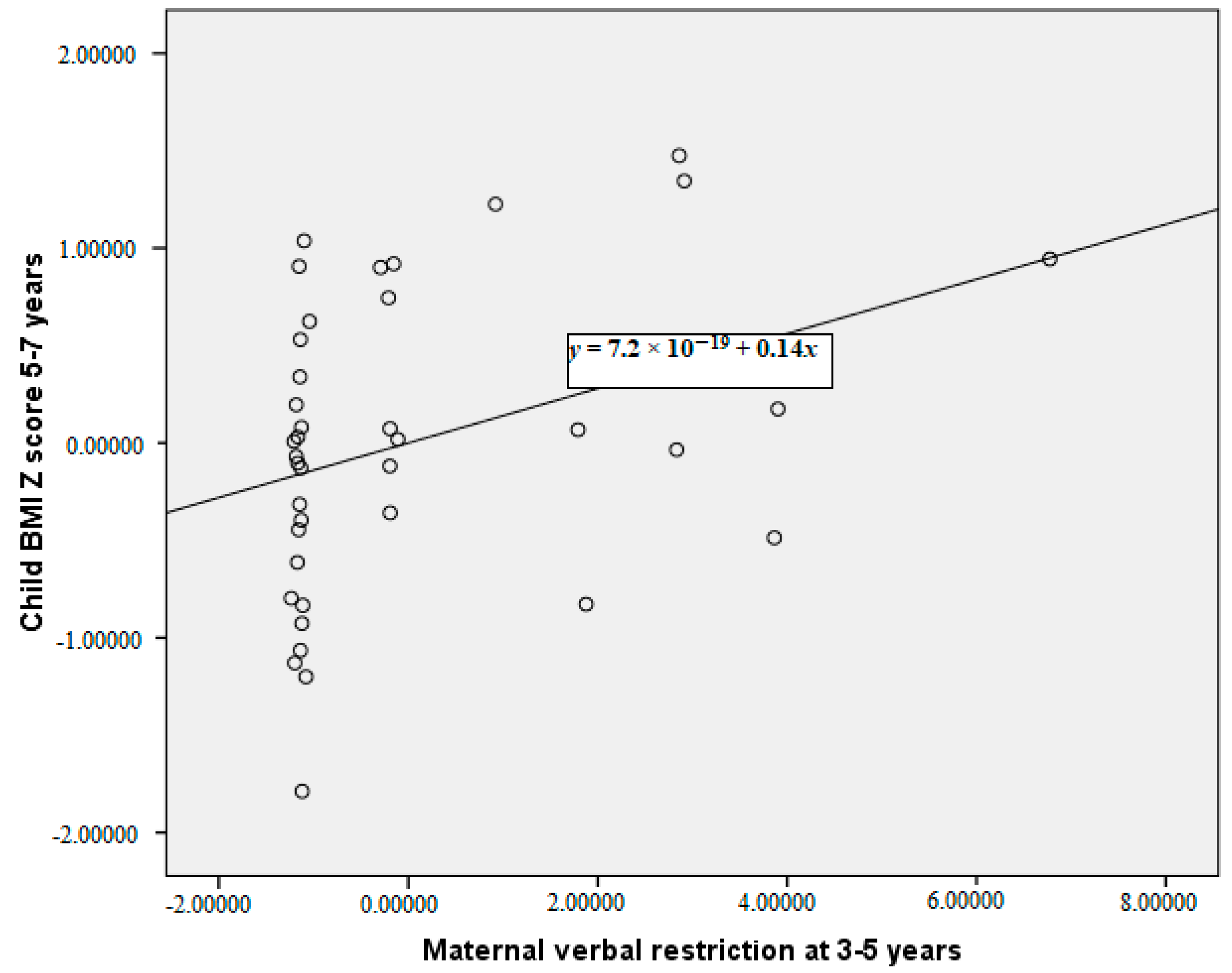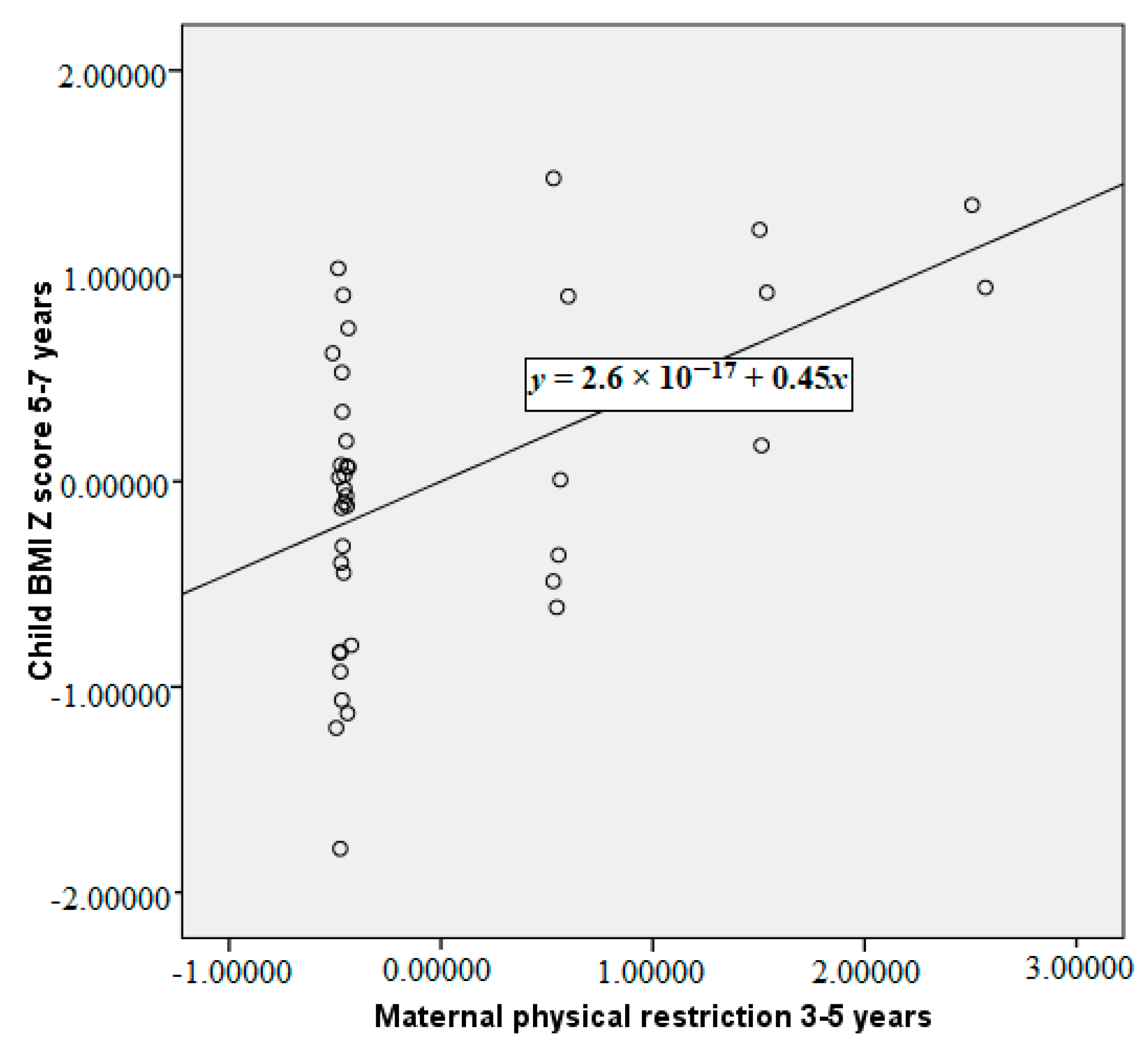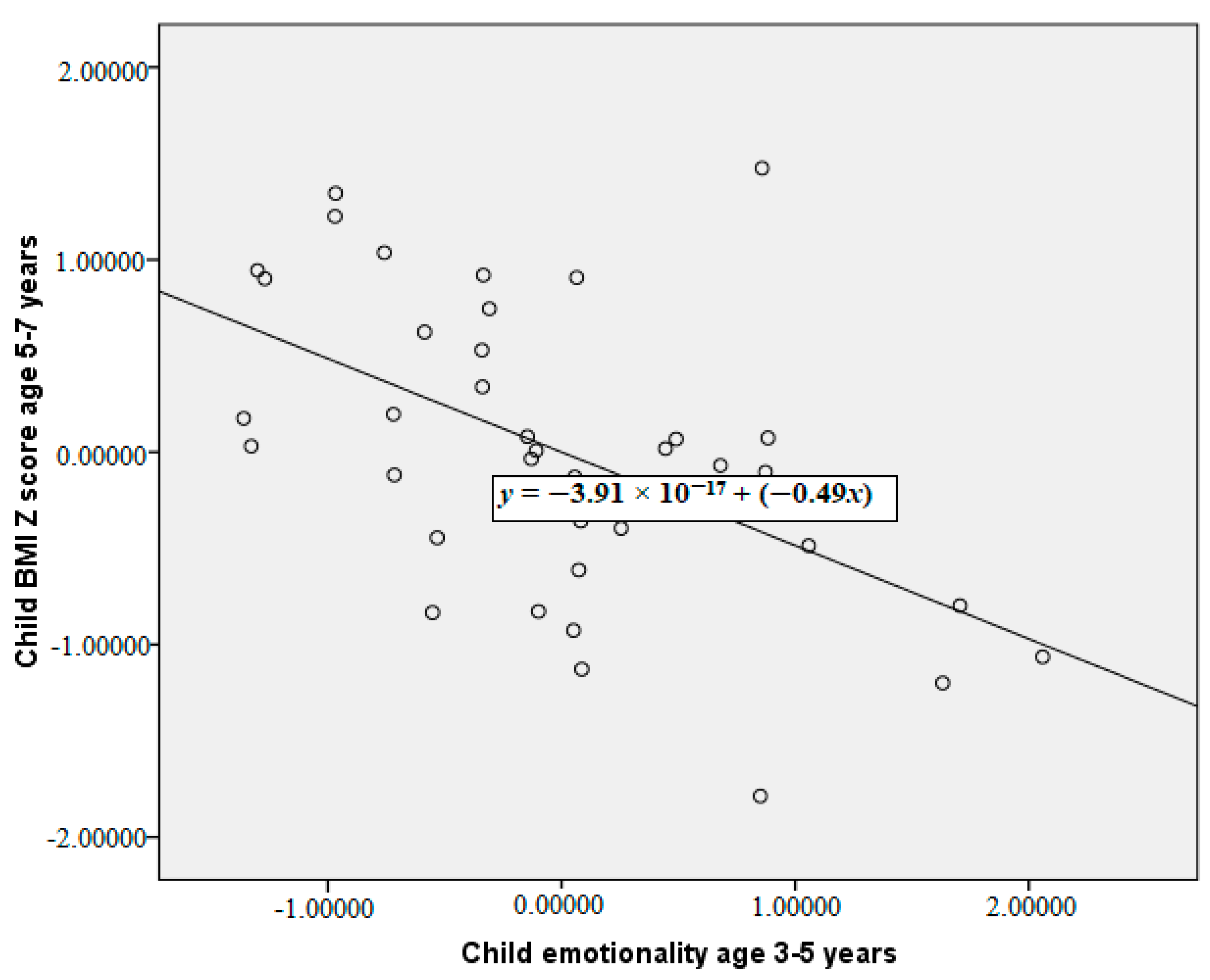Observing Maternal Restriction of Food with 3–5-Year-Old Children: Relationships with Temperament and Later Body Mass Index (BMI)
Abstract
1. Introduction
2. Materials and Methods
2.1. Participants
2.2. Procedure
2.3. Measures
2.4. Data Analysis
3. Results
4. Discussion
5. Conclusions
Author Contributions
Funding
Acknowledgments
Conflicts of Interest
References
- Ogden, J.; Reynolds, R.; Smith, A. Expanding the concept of parental control: A role for overt and covert control in children’s snacking behaviour? Appetite 2006, 47, 100–106. [Google Scholar] [CrossRef] [PubMed]
- Birch, L.L.; Fisher, J.O.; Davison, K.K. Learning to overeat: Maternal use of restrictive feeding practices promotes girls’ eating in the absence of hunger. Am. J. Clin. Nutr. 2003, 78, 215–220. [Google Scholar] [CrossRef] [PubMed]
- Fisher, J.O.; Birch, L.L. Eating in the absence of hunger and overweight in girls from 5 to 7 years of age. Am. J. Clin. Nutr. 2002, 76, 226–231. [Google Scholar] [CrossRef]
- Clark, H.R.; Goyder, E.; Bissell, P.; Blank, L.; Peters, J. How do parents’ child-feeding behaviours influence child weight? Implications for childhood obesity policy. J. Public Health 2007, 29, 132–141. [Google Scholar] [CrossRef] [PubMed]
- Faith, M.S.; Berkowitz, R.I.; Stallings, V.A.; Kerns, J.; Storey, M.; Stunkard, A.J. Parental feeding attitudes and styles and child body mass index: Prospective analysis of a gene-environment interaction. Pediatrics 2004, 114, e429–e436. [Google Scholar] [CrossRef] [PubMed]
- Farrow, C.; Blissett, J.; Haycraft, E. Does child weight influence how mothers report their feeding practices? Int. J. Pediatr. Obes. 2011, 6, 306–313. [Google Scholar] [CrossRef] [PubMed]
- Hughes, S.O.; Frazier-Wood, A.C. Satiety and the self-regulation of food take in children: A potential role for gene-environment interplay. Curr. Obes. Rep. 2016, 5, 81–87. [Google Scholar] [CrossRef] [PubMed]
- Jansen, E.; Mulkens, S.; Jansen, A. Do not eat the red food! Prohibition of snacks leads to their relatively higher consumption in children. Appetite 2007, 49, 572–577. [Google Scholar] [CrossRef] [PubMed]
- Farrow, C.; Blissett, J. Controlling feeding practices: Cause or consequence of early child weight? Pediatrics 2008, 121, e164–e169. [Google Scholar] [CrossRef] [PubMed]
- Harris, H.; Mallan, K.M.; Nambiar, S.; Daniels, L.A. The relationship between controlling feeding practices and boys’ and girls’ eating in the absence of hunger. Eat. Behav. 2014, 15, 519–522. [Google Scholar] [CrossRef] [PubMed]
- Bauer, K.W.; Haines, J.; Miller, A.L.; Rosenblum, K.; Appugliese, D.P.; Lumeng, J.C.; Kaciroti, N.A. Maternal restrictive feeding and eating in the absence of hunger among toddlers: A cohort study. Int. J. Behav. Nutr. Phys. 2017, 19, 172. [Google Scholar] [CrossRef] [PubMed]
- Bergmeier, H.; Skouteris, H.; Horwood, S.; Hooley, M.; Richardson, B. Associations between child temperament, maternal feeding practices and child body mass index during the preschool years: A systematic review of the literature. Obes. Rev. 2014, 15, 9–18. [Google Scholar] [CrossRef] [PubMed]
- Leung, C.Y.; Miller, A.L.; Kaciroti, N.A.; Chen, Y.P.; Rosenblum, K.; Lumeng, J.C. Low-income pre-schoolers with higher temperamental surgency enjoy and respond more to food, mediating the path to higher body mass index. Pediatr. Obes. 2016, 11, 181–186. [Google Scholar] [CrossRef] [PubMed]
- Hittner, J.B.; Johnson, C.; Tripicchio, G.; Faith, M.S. Infant emotional distress, maternal restriction at a home meal and child BMI gain through age 6 years in the Colorado Adoption Project. Eat. Behav. 2016, 21, 135–141. [Google Scholar] [CrossRef] [PubMed]
- Stifter, C.A.; Anzman-Frasca, S.; Birch, L.L.; Voegtline, K. Parent use of food to soothe infant/ toddler distress and child weight status. An exploratory study. Appetite 2011, 57, 693–699. [Google Scholar] [CrossRef] [PubMed]
- Blissett, J.; Farrow, C. Predictors of maternal control of feeding at 1 and 2 years of age. Int. J. Obes. 2007, 31, 1520–1526. [Google Scholar] [CrossRef] [PubMed]
- Rollins, B.Y.; Loken, E.; Savage, J.S.; Birch, L.L. Effects of restriction on children’s intake differ by child temperament, food reinforcement, and parent’s chronic use of restriction. Appetite 2014, 73, 31–39. [Google Scholar] [CrossRef] [PubMed]
- Haycraft, E.L.; Blissett, J.M. Maternal and paternal controlling feeding practices: Reliability and relationships with BMI. Obesity 2008, 16, 1552–1558. [Google Scholar] [CrossRef] [PubMed]
- Sherry, B.; McDivitt, J.; Birch, L.L.; Cook, F.H.; Sanders, S.; Prish, J.L.; Scanlon, K.S. Attitudes, practices, and concerns about child feeding and child weight status among socioeconomically diverse white, Hispanic, and African-American mothers. J. Am. Diet. Assoc. 2004, 104, 215–221. [Google Scholar] [CrossRef] [PubMed]
- Orrell-Valente, J.K.; Hill, L.G.; Brechwald, W.A.; Dodge, K.A.; Pettit, G.S.; Bates, J.E. “Just three more bites”: An observational analysis of parents’ socialization of children’s eating at mealtime. Appetite 2007, 48, 37–45. [Google Scholar] [CrossRef] [PubMed]
- Hodges, E.A.; Johnson, S.L.; Hughes, S.O.; Hopkinson, J.M.; Butte, N.F.; Fisher, J.O. Development of the Responsiveness to Child Feeding Cues Scale. Appetite 2014, 65, 210–219. [Google Scholar] [CrossRef] [PubMed]
- Buss, A.H.; Plomin, R. Theory and measurement of EAS. In Temperament: Early Developing Personality Traits; Lawrence Erlbaum Associates: Hillsdale, NJ, USA, 1984; pp. 84–104. [Google Scholar]
- Haycraft, E.; Farrow, C.; Meyer, C.; Powell, F.; Blissett, J. Relationships between temperament and eating behaviours in young children. Appetite 2011, 56, 689–692. [Google Scholar] [CrossRef] [PubMed]
- Holley, C.E.; Farrow, C.; Haycraft, E. Investigating the role of parent and child characteristics in healthy eating intervention outcomes. Appetite 2016, 105, 291–297. [Google Scholar] [CrossRef] [PubMed]
- Mathiesen, K.S.; Tambs, K. The EAS temperament questionnaire—Factor structure, age trends, reliability, and stability in a Norwegian sample. J. Child. Psychol. Psychiatry 1999, 40, 431–439. [Google Scholar] [CrossRef] [PubMed]
- Freeman, J.V.; Cole, T.J.; Chinn, S.; Jones, P.R.M.; White, E.M.; Preece, M.A. Cross-sectional stature and weight reference curves for the UK, 1990. Arch. Dis. Child. 1995, 73, 17–24. [Google Scholar] [CrossRef] [PubMed]
- Cole, T.J. Conditional reference charts to assess weight gain in British infants. Arch. Dis. Child. 1995, 73, 8–16. [Google Scholar] [CrossRef] [PubMed]
- Palfreyman, Z.; Haycraft, E.; Meyer, C. Parental modelling of eating behaviours: Observational validation of the Parental Modelling of Eating Behaviours scale (PARM). Appetite 2015, 86, 31–37. [Google Scholar] [CrossRef] [PubMed]
- Farrow, C.; Blissett, J. Maternal cognitions, psychopathologic symptoms, and infant temperament as predictors of early infant feeding problems: A longitudinal study. Int. J. Eat. Disord. 2006, 39, 128–134. [Google Scholar] [CrossRef] [PubMed]
- Jacobi, C.; Agras, W.S.; Bryson, S.; Hammer, L.D. Behavioral validation, precursors, and concomitants of picky eating in childhood. J. Am. Acad. Child Adolesc. Psychiatry 2003, 42, 76–84. [Google Scholar] [CrossRef] [PubMed]
- Steinsbekk, S.; Bonneville-Roussy, A.; Fildes, A.; Llewellyn, C.H.; Wichstrom, L. Child and parent predictors of picky eating from preschool to school age. Int. J. Behav. Nutr. Phys. Act. 2017, 14. [Google Scholar] [CrossRef] [PubMed]
- Blissett, J.; Bennett, C. Cultural differences in parental feeding practices and children’s eating behaviours and their relationships with child BMI: A comparison of Black Afro-Caribbean, White British and White German samples. Eur. J. Clin. Nutr. 2013, 67, 180–184. [Google Scholar] [CrossRef] [PubMed]



| Observed Restriction Behaviours | N = 39 b |
|---|---|
| Mean (Min–Max) | |
| Maternal verbal restriction of food | 1.15 (0–8) |
| Child acceptance of verbal restriction (count) | 0.74 (0–5) |
| Child rejection of verbal restriction (count) | 0.41 (0–6) |
| Child acceptance of verbal restriction (percentage) | 66.56 a (1–100) |
| Maternal physical restriction of food | 0.46 (0–3) |
| Child acceptance of physical restriction (count) | 0.31 (0–2) |
| Child rejection of physical restriction (count) | 0.15 (0–2) |
| Child acceptance of physical restriction (percentage) | 69.70 a (0–100) |
| Child temperament: | |
| Emotionality | 2.33 (1–4.40) |
| Sociability | 3.56 (2.6–5) |
| Child Weight and Temperament | Child BMI Z-Score (5–7 Years) a N = 39 d | Child Emotionality b (3–5 Years) N = 39 d | Child Sociability c (3–5 Years) N = 39 d |
|---|---|---|---|
| Observed restriction behaviours (child age 3–5 years): | |||
| Verbal restriction by mother | 0.34 * | −0.18 | −0.05 |
| Child acceptance verbal restriction (count) | 0.26 | −0.09 | −0.03 |
| Child rejection verbal restriction (count) | 0.270 * | −0.19 | −0.04 |
| Child acceptance verbal restriction (%) | −0.14 | −0.14 | −0.04 |
| Physical restriction by mother | 0.47 ** | −0.35 * | −0.10 |
| Child acceptance physical restriction (count) | 0.43 ** | −0.29 * | −0.04 |
| Child rejection physical restriction (count) | 0.29 * | −0.23 | −0.14 |
| Child acceptance physical restriction (%) | 0.13 | −0.05 | 0.35 |
| Child temperament at child age 3–5 years: | |||
| Emotionality | −0.53 ** | - | - |
| Sociability | −0.16 | - | - |
© 2018 by the authors. Licensee MDPI, Basel, Switzerland. This article is an open access article distributed under the terms and conditions of the Creative Commons Attribution (CC BY) license (http://creativecommons.org/licenses/by/4.0/).
Share and Cite
Farrow, C.V.; Haycraft, E.; Blissett, J.M. Observing Maternal Restriction of Food with 3–5-Year-Old Children: Relationships with Temperament and Later Body Mass Index (BMI). Int. J. Environ. Res. Public Health 2018, 15, 1273. https://doi.org/10.3390/ijerph15061273
Farrow CV, Haycraft E, Blissett JM. Observing Maternal Restriction of Food with 3–5-Year-Old Children: Relationships with Temperament and Later Body Mass Index (BMI). International Journal of Environmental Research and Public Health. 2018; 15(6):1273. https://doi.org/10.3390/ijerph15061273
Chicago/Turabian StyleFarrow, Claire V., Emma Haycraft, and Jacqueline M. Blissett. 2018. "Observing Maternal Restriction of Food with 3–5-Year-Old Children: Relationships with Temperament and Later Body Mass Index (BMI)" International Journal of Environmental Research and Public Health 15, no. 6: 1273. https://doi.org/10.3390/ijerph15061273
APA StyleFarrow, C. V., Haycraft, E., & Blissett, J. M. (2018). Observing Maternal Restriction of Food with 3–5-Year-Old Children: Relationships with Temperament and Later Body Mass Index (BMI). International Journal of Environmental Research and Public Health, 15(6), 1273. https://doi.org/10.3390/ijerph15061273





